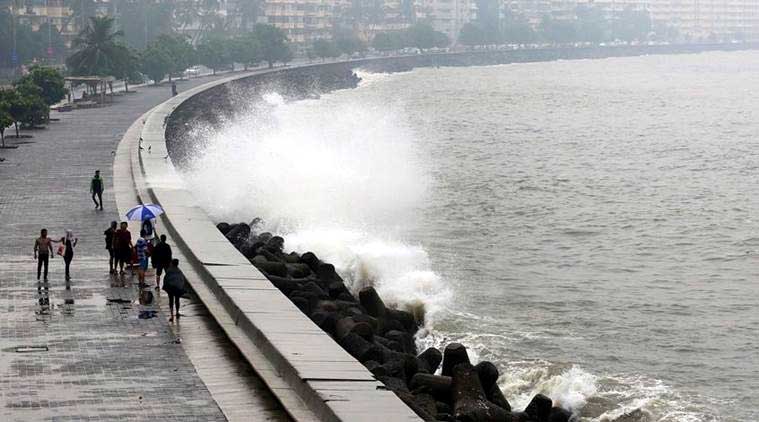The minutes of the Standing
Committee of the National Board of Wildlife (NBWL) meeting, conducted on
June 13, mentions that the species faces risks from shipping and
fishing activities.
Written by Benita Chacko
|
Published: August 22, 2018 12:29:20 am
 The Arabian Sea Humpback Whale is found along the Maharashtra coast.
The Arabian Sea Humpback Whale is found along the Maharashtra coast.
THE STATE Mangrove Cell will soon submit a proposal for the
protection of the Arabian Sea Humpback Whale as part of the Centre’s
Recovery Programme for Critically Endangered Species. The cell hopes
this will be a timely step to protect the marine creature from
extinction.“We have prepared a proposal for the programme and will soon submit it. The Centre has taken a positive step towards conservation and we will do our bit to protect the species,” said N Vasudevan, Additional Principal Chief Conservator of Forests, Maharashtra Mangrove Cell.
Among other places, the Arabian Sea Humpback Whale is found along the Maharashtra coast, as it migrates from the Oman coast to the Sri Lanka coast. The state proposes to first study the pattern of migration, its population and distribution to plan their conservation. “We will use noise monitoring machines underwater that will record sounds. This will include sounds they make during mating along with sounds of other marine creatures. The study of these sounds will help us understand their mating time, their migratory patterns and other details,” said Vasudevan.
The minutes of the Standing Committee of the National Board of Wildlife (NBWL) meeting, conducted on June 13, mentions that the species faces risks from shipping and fishing activities. “Studies also indicate that only very few individuals are available in the Arabian Sea. Accidental entanglements in fishing gear, ship strikes and seismic exploration are the principal threats to the species,” reads the minutes.
“The species face the largest risk from shipping activity as they are often injured by the ship propeller. They are also affected by gillnet fishing and longline fishing as they get entangled in it and drown. They need to come out of the water to breathe. They are large mammals and there aren’t too many of them as they give birth only once in two years. They have a long gestation period and the calf remains with the mother for long,” said Dr Deepak Apte, Marine Ecologist and Director, Bombay Natural History Society (BNHS).
Apte added that the inclusion of the species in the programme is well-timed and much-needed. “Their inclusion will help conduct some studies on them, which will provide valuable inputs. We do not know much about them at present. If we do systematic mapping of the species and study their population and distribution, it will help us reduce their ship-based mortality. We can also study their genetic make-up, which will help us know which clan they belong to,” he said.
The mangrove cell plans to work on conservation efforts for the species through these studies. “Once we know their migration pattern and their mating time, we can direct ship companies from avoiding their path during these periods. We can also prevent fishing in those areas. This will help in reducing the mortality rates,” said Vasudevan.
However, the whales being an offshore species makes the study challenging. “They do not come very close to the shore. So, we will need to have a set-up for the study team to go into deep sea. The study will take at least 10 years to complete,” said Apte.
India’s commitment to the protection of whales and their habitats in its waters also stems from the fact that it is a party to the International Whaling Commission. During the NBWL meeting, it was also decided to include Northern River Terrapin, Clouded Leopard and Red Panda in the recovery programme. Species such as Snow Leopard, Bustard (including Floricans), Dolphin, Nilgiri Tahr, Marine Turtles, Asian Wild Buffalo, Manipur Brow-antlered Deer, Vultures, Malabar Civet, Indian Rhinoceros, Asiatic Lion and Swamp Deer are already a part of the programme.
https://indianexpress.com/article/cities/mumbai/mangrove-cell-to-submit-proposal-for-conservation-of-arabian-sea-humpback-whale-5318276/
No comments:
Post a Comment